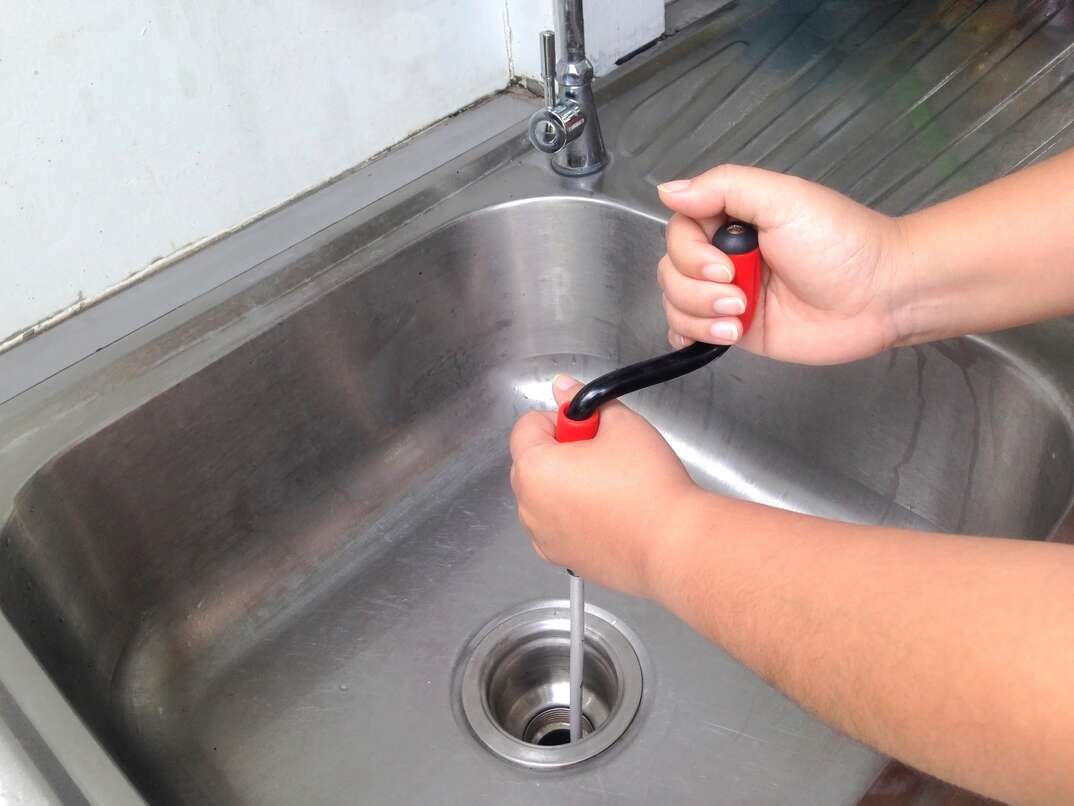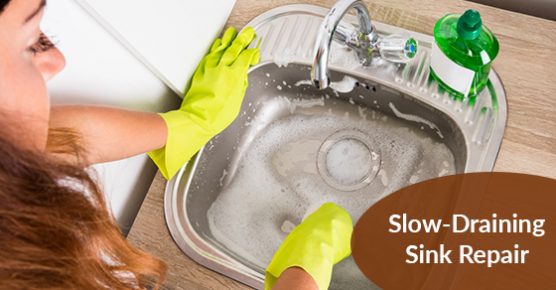Straightforward Instructions To Address A Slow-Draining Sink
Straightforward Instructions To Address A Slow-Draining Sink
Blog Article
They are making several great points on the subject of 7 Ways To Fix A Slow-Draining Sink Before You Call A Plumber overall in the content directly below.

Introduction
We've all been there: You're brushing your teeth or washing your hands, and you discover the water pooling in the sink. Instead of swiftly swirling down the tubes, it lingers, transforming your once-refreshing early morning routine right into a small overload scene. A slow-draining sink isn't just annoying; it's usually an indication of larger plumbing issues hiding beneath the surface. Fortunately is that many slow-draining sinks can be repaired with a little expertise, a couple of standard devices, and some perseverance. Prepared to tackle this task head-on? Allow's roll up our sleeves and dive right in.
Recognizing the Sources Of a Slow-Draining Sink
Prior to you begin poking around in your pipelines, it helps to know what could be creating the stagnation. Comprehending the source makes it easier to pick the right repair.
Devices and Materials You'll Require
The right tools make all the difference. Luckily, you won't require a completely equipped plumbing technician's van to get the job done.
Step-by-Step Guide to Dealing With a Slow-Draining Sink
Now, allow's get involved in the nitty-gritty. This step-by-step procedure will certainly guide you through simple methods to recover your sink's drain.
Step 1: Remove and Clean the Stopper
Frequently, the stopper (that small plug you push down to obstruct water) is the initial perpetrator. Remove it very carefully and clean off any kind of hair or substance trapped around its base. Wash it completely before placing it back in place.
Action 2: Use a Bettor to Remove Debris
Got that bettor ready? Setting it over the drain and give it a few company pumps. The idea is to develop suction that can loosen any kind of clog. If you see little bits of debris floating up, you get on the best track.
Action 3: Attempt a Drainpipe Snake or Cord Wall Mount
If the bettor does not work, it's time to bring out the drain snake. Carefully feed it into the drainpipe and spin as you go. You might feel some resistance-- that's likely the obstruction. Keep twisting and pulling until you eliminate the blockage. If you do not have a drainpipe serpent, a straightened wire hanger can work in a pinch.
Step 4: Apply a DIY Drain Cleaner
An all-natural cleaner made from baking soda and vinegar can break down residual grime. Put half a mug of cooking soft drink right into the drainpipe, complied with by half a mug of vinegar. Let it fizz for about 15 minutes, then flush with hot water. This chain reaction often does marvels for minor obstructions.
Step 5: Reassemble and Evaluate the Sink
Placed everything back with each other and run the tap. Does the water currently swirl down the drain at a commendable speed? If yes, give on your own a pat on the back. If not, do not despair-- there are still a few even more tricks up your sleeve.
Vital Devices for DIY Services
A plunger is your go-to beginning factor. A little, sink-sized bettor creates suction that can remove small blockages. For even more persistent obstructions, a drainpipe serpent (in some cases called a plumbing professional's auger) functions marvels. A pair of handwear covers, a flashlight, and maybe a set of safety goggles are likewise handy.
Suggested Cleansing Solutions
Light meal soap and hot water can assist break down oily accumulation. A mix of baking soda and vinegar is a time-tested natural remedy, and enzymatic cleaners supply a more eco-friendly approach. Maintain chemical drainpipe cleaners as a last resort, as they can be extreme on your pipes.
Typical Perpetrators Behind Slow Water Drainage
So, what's obstructing points up? Generally, it's a mix of everyday debris-- think hair, soap residue, tooth paste deposit, and leftover food particles. Over time, these little bits collect and cling to the pipeline wall surfaces, gradually tightening the flow and making it harder for water to go through. In some cases, mineral deposits from hard water can additionally contribute to the crud, producing the best storm for persistent obstructions.
When is it Time to Do Something About It?
If you notice the water draining pipes slower than usual, it's a great concept to intervene earlier rather than later. Waiting as well long can bring about finish clogs, unpleasant odors, or perhaps pipeline damage. If the water takes greater than a few seconds to clean out after switching off the faucet, consider it a red flag and prepare to place on your do it yourself hat.
Safety And Security First: Precautions and Preparations
Before you launch into unclogging setting, think about safety. You're taking care of potentially filthy water and debris, so slip on a pair of handwear covers. If you're making use of chemical cleansers, make sure the space is well-ventilated and adhere to the guidelines on the tag.
Protective Gear and Work Space Configuration
Put down some old towels or cloths around the sink area to catch sprinkles. Eliminate any items that may get in your way, like soap dispensers or tooth brush holders. Make certain you have good lighting-- get hold of a flashlight if required.
Alternative Approaches for Stubborn Clogs
Not all blockages are developed equal. If your sink still declines to cooperate, take into consideration these alternate solutions.
Baking Soda and Vinegar Approach
We currently touched on this, however it deserves noting once again. This mild, environmentally friendly technique is more secure than chemical cleansers and usually quite effective.
Enzymatic Drain Cleaners
Enzyme-based cleaners use natural microorganisms to digest organic matter. They're an exceptional selection if you're looking to avoid extreme chemicals. Simply bear in mind, they might take a bit longer to work their magic.
Chemical Drain Cleaners: Benefits And Drawbacks
Chemical cleansers can blow up with hard blockages quickly, however they're not without drawbacks. They can generate heat and fumes, damages pipelines if made use of exceedingly, and position environmental risks. Use them moderately, and constantly comply with the directions very carefully.
Preventive Measures to Maintain Your Sink Flowing
Avoidance is the most effective treatment. By taking on a few easy practices, you can keep your sink from reducing to begin with.
Routine Cleaning Up Habits
Wipe down the sink basin and component area on a regular basis. Get rid of hair or food particles before they have an opportunity to wash down the drainpipe.
Preventing Dangerous Compounds Down the Drain
Reconsider before unloading coffee grounds, grease, or fibrous veggie scraps down the sink. These perpetrators cling to pipeline wall surfaces, producing blockages over time.
Regular Upkeep Checks
Schedule a fast month-to-month examination. Run hot water through the sink for a couple of minutes, taking note of the circulation. If it seems sluggish, act quickly before it comes to be a full-blown clog.
When to Call a Specialist Plumbing Technician
Sometimes, despite how tough you try, that block simply will not move. That's when it's time to bring in the pros.
Indicators That Indicate a More Serious Concern
If your sink drains gradually regardless of multiple efforts, or if you notice water backing up in various other fixtures (like your shower or bathroom), you may have a more significant pipes issue prowling deeper in the system.
Balancing Do It Yourself Initiatives with Specialist Aid
While do it yourself can conserve you money and supply a sense of achievement, there's no embarassment in calling a specialist. A professional plumbing can assess your entire pipes configuration, ensuring there's no underlying damages or lasting trouble that could cost you much more down the road.
Comparing Costs and Long-Term Solutions
Prior to deciding, think about the big picture. A low-cost, quick fix might fix the issue temporarily, yet investing in a much more irreversible option can conserve you money and stress and anxiety in the future.
Evaluating the Expenses of Do It Yourself vs. Expert Fixes
Do it yourself fixes often set you back little more than the rate of a bettor or a container of cooking soda. Expert solutions, on the other hand, come with a price however might stop repeated problems and pricey repair work later on.
Purchasing High Quality Fixtures and Upgrades
If your sink's style adds to constant obstructions, it might be worth upgrading to higher-quality components or altering the plumbing format. Consider this a financial investment in your house's performance and comfort.
Conclusion
A slow-draining sink can seem like a minor irritation, however it's often a sign that your plumbing needs a little TLC. By understanding the root causes, using the right tools and techniques, and dedicating to straightforward preventive measures, you can keep your sink streaming easily. And when all else falls short, never be reluctant to call a professional-- your home's plumbing is worth the investment in care and maintenance.
Three Common Ways to Fix a Slow Drain
Baking Soda Method
Boil a full pot of water. Measure out cup of baking soda and pour it down the drain. Then take cup of the magical cleansing substance known as white vinegar and drop that down there too. Allow the mixture to fizz in the drain for five minutes as the vinegar and baking soda combine. Now dump in that whole pot of boiling water. This combination of cleaning substances should clear out anything that is causing your sink to drain slowly. If it doesn t...
Zip-It
If the baking soda method doesn t clear out your drain, it may be because a significant amount of hair and/or other debris has collected there and you need to remove it. Purchase a Zip-It tool at any home improvement or hardware store and insert it into your drain. It will catch any collected hair or debris that s blocking the flow of water. Pull it out. If it s got a big clump of hair, etc. on the end, you ve probably got your culprit.
Drain Cleaner
If these methods don t work, there is the standard drain cleaner that you can also buy in a hardware store or even your local grocery store. It s better if you can use a household solution, but these drain cleaners often work in a pinch. They re very simple to use. You generally just dump them in your drain and wait. If even this method is not effective, it may be time to call the plumber.
https://www.mrrooter.com/oneida/about-us/blog/2017/july/three-common-ways-to-fix-a-slow-drain/

I recently found that article about How to Fix a Slow Draining Sink when doing a lookup on the web. So long as you liked our blog post if you please be sure to share it. Thanks a lot for your time invested reading it.
Book Services Report this page